Aletta Shikololo
As government embarks on transforming the education sector and embracing changes, the urgent need to invest in inclusive digital learning technology that benefits all Namibian children is all too clear.
Disparities in digital education within the education sector are particularly evident. Last year, minister of education, arts and culture Anna Nghipondoka revealed that only 13 000 pupils had accessed the ministry’s e-learning platforms during the national lockdown.
This is less than 2% of the total population of 804 000 pupils in Namibia’s State and private schools.
Despite the efforts to bridge this gap in an attempt to catch up with the global trend, the ministry’s executive director, Sanet Steenkamp, acknowledged there is still a long road to attain inclusive digital learning; however, the ministry will begin to slowly implement the system.
“The issue of digitalisation has become very topical, especially the fact that so many of the rural areas do not have network coverage – and it is also for that reason that the ministry has decided to only focus now on our Advanced Subsidiary (AS) schools and provide them with the required license and the whiteboard,” she told New Era.
Steenkamp further noted that at the moment, there are about 81 AS schools that will be assisted with the necessary digital technologies. “At this stage, we are still in communication with a telecommunication company to see how best we can work on specific packages, but everything will all depend on the availability of resources and how much funds will be allocated to the ministry this year,” she explained.
Considering the inequality in terms of network coverage in many areas, especially during the Covid-19 pandemic, Steenkamp said some schools have embraced the challenge; however, others had difficulties reaching their learners.
She, thus, added that the hybrid system has shown that face-face learning remains crucial. “As the world is celebrating International Education Day, one of the key issues is transforming lives – and we can still transform the lives of our children with good quality education if we start with the basics and build on that in order to excel,” she said.
Steenkamp indicated that the ministry and its development partners are working on the finalisation of the ICT policy.
Coalition of action
Speaking to this publication, the Namibia National Students Organisation acting president, Gregory Madi said the organisation is in full support of the ministry’s decision towards digital learning. “We are looking into developing infrastructure, especially in the direction of ICT. Although not everything will be implemented right now, we are glad we are heading in the right direction,” he said.
We are not ready
According to Mahongora Kavihuha, general secretary of the Teachers Union of Namibia, conversations around digital learning are just political statements until the country implements a policy on digital learning.
“That is only implemented when the government observes a deficit or opportunity to implement such through a comprehensive assessment. That assessment should indicate the way forward in terms of investments into digital learning. In a country with so much inequality, how is that going to be held out,” he said, adding that the ministry should first work on a realistic assessment rather than just making statements.
As the world commemorated the fourth International Education Day yesterday, the ministry also officially opened the 2022 academic year, held under the theme ‘Changing cause, transforming lives’.
- ashikololo@nepc.com.na


